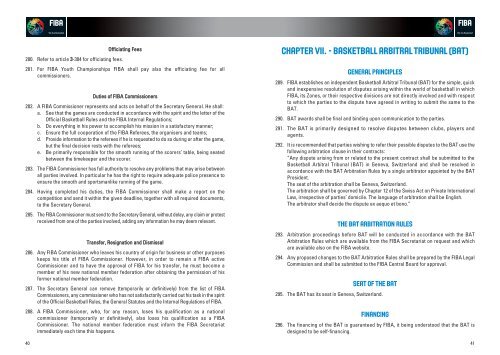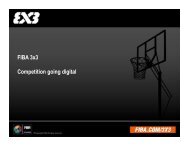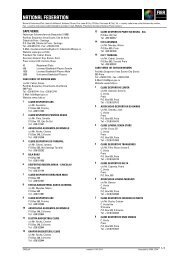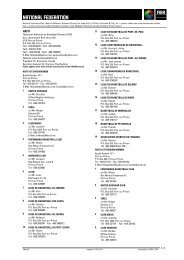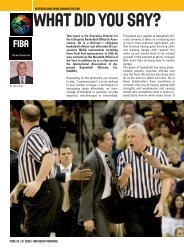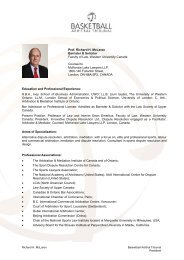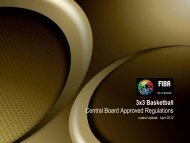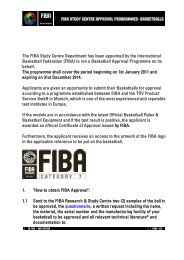Book 3 - Fiba
Book 3 - Fiba
Book 3 - Fiba
You also want an ePaper? Increase the reach of your titles
YUMPU automatically turns print PDFs into web optimized ePapers that Google loves.
280. Refer to article 3-304 for officiating fees.<br />
Officiating Fees<br />
281. For FIBA Youth Championships FIBA shall pay also the officiating fee for all<br />
commissioners.<br />
Duties of FIBA Commissioners<br />
282. A FIBA Commissioner represents and acts on behalf of the Secretary General. He shall:<br />
a. See that the games are conducted in accordance with the spirit and the letter of the<br />
Official Basketball Rules and the FIBA Internal Regulations;<br />
b. Do everything in his power to accomplish his mission in a satisfactory manner;<br />
c. Ensure the full cooperation of the FIBA Referees, the organisers and teams;<br />
d. Provide information to the referees if he is requested to do so during or after the game,<br />
but the final decision rests with the referees;<br />
e. Be primarily responsible for the smooth running of the scorers’ table, being seated<br />
between the timekeeper and the scorer.<br />
283. The FIBA Commissioner has full authority to resolve any problems that may arise between<br />
all parties involved. In particular he has the right to require adequate police presence to<br />
ensure the smooth and sportsmanlike running of the game.<br />
284. Having completed his duties, the FIBA Commissioner shall make a report on the<br />
competition and send it within the given deadline, together with all required documents,<br />
to the Secretary General.<br />
285. The FIBA Commissioner must send to the Secretary General, without delay, any claim or protest<br />
received from one of the parties involved, adding any information he may deem relevant.<br />
Transfer, Resignation and Dismissal<br />
286. Any FIBA Commissioner who leaves his country of origin for business or other purposes<br />
keeps his title of FIBA Commissioner. However, in order to remain a FIBA active<br />
Commissioner and to have the approval of FIBA for his transfer, he must become a<br />
member of his new national member federation after obtaining the permission of his<br />
former national member federation.<br />
287. The Secretary General can remove (temporarily or definitively) from the list of FIBA<br />
Commissioners, any commissioner who has not satisfactorily carried out his task in the spirit<br />
of the Official Basketball Rules, the General Statutes and the Internal Regulations of FIBA.<br />
288. A FIBA Commissioner, who, for any reason, loses his qualification as a national<br />
commissioner (temporarily or definitively), also loses his qualification as a FIBA<br />
Commissioner. The national member federation must inform the FIBA Secretariat<br />
immediately each time this happens.<br />
40<br />
Chapter VII. - Basketball Arbitral Tribunal (BAT)<br />
General Principles<br />
289. FIBA establishes an independent Basketball Arbitral Tribunal (BAT) for the simple, quick<br />
and inexpensive resolution of disputes arising within the world of basketball in which<br />
FIBA, its Zones, or their respective divisions are not directly involved and with respect<br />
to which the parties to the dispute have agreed in writing to submit the same to the<br />
BAT.<br />
290. BAT awards shall be final and binding upon communication to the parties.<br />
291. The BAT is primarily designed to resolve disputes between clubs, players and<br />
agents.<br />
292. It is recommended that parties wishing to refer their possible disputes to the BAT use the<br />
following arbitration clause in their contracts:<br />
“Any dispute arising from or related to the present contract shall be submitted to the<br />
Basketball Arbitral Tribunal (BAT) in Geneva, Switzerland and shall be resolved in<br />
accordance with the BAT Arbitration Rules by a single arbitrator appointed by the BAT<br />
President.<br />
The seat of the arbitration shall be Geneva, Switzerland.<br />
The arbitration shall be governed by Chapter 12 of the Swiss Act on Private International<br />
Law, irrespective of parties’ domicile. The language of arbitration shall be English.<br />
The arbitrator shall decide the dispute ex aequo et bono.”<br />
The BAT Arbitration Rules<br />
293. Arbitration proceedings before BAT will be conducted in accordance with the BAT<br />
Arbitration Rules which are available from the FIBA Secretariat on request and which<br />
are available also on the FIBA website.<br />
294. Any proposed changes to the BAT Arbitration Rules shall be prepared by the FIBA Legal<br />
Commission and shall be submitted to the FIBA Central Board for approval.<br />
Seat of the BAT<br />
295. The BAT has its seat in Geneva, Switzerland.<br />
Financing<br />
296. The financing of the BAT is guaranteed by FIBA, it being understood that the BAT is<br />
designed to be self-financing.<br />
41


